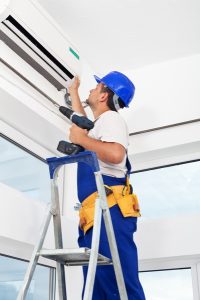If you’re looking for a way to keep your home cool in summer and efficiently heated in winter, you might think that your only option is a standard furnace and AC or heat pump connected to a network of ducts. Since central heating and cooling became common in homes in the 1970s, this type of ducted system has been the standard. But the introduction of ductless HVAC systems has challenged traditional ducted systems. For a deeper comparison of your options, check out how to choose the next AC system installation to align comfort with long-term value.
If you’re considering a new heating and cooling system for your home, is ductless heating and ductless cooling in Decatur, GA the best choice? Or should you stay with the tried-and-true traditional system? We’ll look into this further below.
What to Know About Ductless HVAC Systems
Ductless HVAC systems, also known as mini-split systems, are types of heat pumps that consist of an outdoor unit and one or more indoor air handling units. These units connect to the outdoor unit through conduits that house the power cable, refrigerant tubing, suction tubing, and a condensate drain. The indoor air handlers send conditioned air directly into the living spaces, bypassing the need for ducts.
Pros of Ductless HVAC Systems
- Energy efficiency: Ductless systems often have higher efficiency ratings compared to traditional systems, meaning they can be more energy-efficient and potentially lower your utility bills. To learn more about these metrics, explore the key energy efficiency ratings you should know for HVAC installations and how they can affect your utility costs and system performance.
- Flexibility: Ductless systems offer zoned heating and cooling, allowing you to control the temperature of individual rooms independently.
- Ease of installation: Without the need for extensive ductwork, installation is typically quicker and less invasive, making it ideal for older homes or add-ons.
- Improved air quality: Ductless systems reduce the spread of dust, allergens, and pollutants because there are no ducts where these can accumulate.
Cons of Ductless HVAC Systems
- Appearance: Indoor units are mounted on walls or ceilings, which might not suit everyone’s visual preferences.
- Redundancy: For homes that already have ductwork in place for a standard ductless system, ductless makes less sense—especially with the cost involved.
- Maintenance: Regular maintenance is crucial to ensure the system runs efficiently, including cleaning filters and checking refrigerant levels.
Choosing Between Ductless and Traditional HVAC
Ductless HVAC Has the Edge If…
- You live in an older home: If your home lacks existing ductwork, a ductless system can be a less invasive and more cost-effective option. In fact, many homeowners ask if it’s possible to add central AC to a house without ducts—and while it is, a ductless system may be a more efficient and simpler solution.
- You want zoned heating and cooling: Homes with multiple stories or rooms that require different temperature settings can benefit from the flexibility of ductless systems.
- You’re adding on/converting: Home additions, such as a new bedroom or sunroom, or room conversions, such as attic and garage conversions, are ideal candidates for ductless systems, avoiding the need to extend existing ductwork.
Traditional HVAC Has the Edge If…
- You want whole-home coverage: If you prefer uniform temperature control throughout your home, a traditional HVAC system might be more suitable.
- Your home has existing ductwork: Using existing ductwork can make the installation of a traditional system more straightforward and cost-effective.
- Appearance is important: If you prefer not to have visible indoor units on your walls or ceilings, a traditional system keeps components hidden.
Final Tips for Picking the Right HVAC System
We can’t tell you in a blog post the right choice for your home. We recommend you schedule an appointment with our Premier experts for a consultation. We can offer you personalized recommendations and help you balance the pros and cons based on your home. We’re here to ensure your home stays comfortable year-round.


